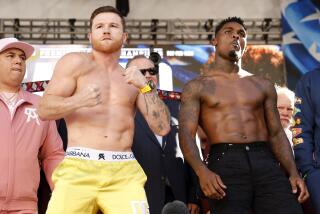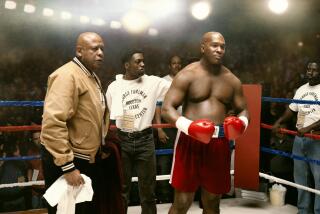He’s Cruising Toward Title--Cautiously
- Share via
Some months ago, in a bout against an in-an-outer named Howard Lake, heavyweight Henry Tillman was busy shoe-shining his opponent.
That is a show-off maneuver in which a pug aims a series of underhand blows in machine-gun succession, rat-a-tat-tat, to the midsection of his opponent, much in the manner of a bootblack furiously snapping a rag over the toes of a pair of wing-tips in a train station.
The blows are designed for show, not effect. They are intended to distract, not to hurt, and are usually accompanied by a little tap dance or Ali soft-shoe shuffle.
Some time in the middle of his routine, just as he was feeling a little like Bojangles about the whole thing, Tillman became aware of the referee leaning over him and shouting, “Three!”
At ringside, he made out the face of his trainer, Mercer Smith, inquiring anxiously, “Ain’t you gonna get up?”
Henry was annoyed. “What you talking about!” he demanded. “I am up!”
“OK,” Smith said. “Let me see you walk on the ceiling then.”
In recalling the incident the other day, Tillman admitted: “The man surprised me.”
Tillman got up and won the fight. He has never lost one as a pro, but his whole career has been a series of surprises.
First of all, Tillman never intended to be a prizefighter. He had a lively career going on the streets of South Central Los Angeles. He dealt in goods and services. Unfortunately, they were someone else’s goods and the services were illegal.
Some careers are designed to land you in the executive suite. Henry’s was designed to land him where it did, Cell 42 V of the California Youth Authority prison in Chino. He had been convicted of armed robbery.
Always a man to keep an ear to the ground and an eye on the dealer, Tillman soon learned that the superintendent at the facility was partial to boxers.
Tillman had never been one, but he was flexible and never one to let details stand in his way. He invented a five-year career in response to a query from the veteran prison camp physical education instructor, Mercer Smith.
Smith, who had been a pretty good featherweight in his day, knew that Tillman had been exaggerating the first time the youngster put on the gloves at Chino. The evidence was devastating. Henry got knocked flat. “He did everything wrong, except one thing,” Smith said. “He got up.”
Tillman did more than that. He got better. Within months, he was the best fighter in Chino. And since he was fighting certifiable homicidal types, the toughest the mean streets of Los Angeles had to offer, this was no easy feat.
“I wasn’t tougher than they were--I was smarter,” said Tillman, who prides himself on being the thinking man’s pugilist. “You know how it was in there. Nobody did what they done to get there. They took the position, ‘I shouldn’t be here.’ It was somebody else’s fault, and they would want to beat up on you for it. You’d be fighting, anyway. Of course, a lot of guys who thought they were tough wouldn’t go in that ring with a 10-foot pole.”
They didn’t like the sight of their own blood. But Tillman climbed into the ring. And paid his dues. And paid off on his hunch. The California Youth Authority is based on the philosophy that its wards are still salvageable, that they are not yet committed to crime and that at least one of three can be lured out of it.
Henry Tillman became one of their success stories. As his prowess grew, Smith, his friend and now trainer, wangled furloughs for him so he could fight in tournaments in such faraway places as Indianapolis and Houston.
“He had never been on an airplane before,” Smith recalled. “He had never met the kind of people he was now meeting.”
Henry was impressed. You didn’t need a gun and a rope to make it in society.
“I got home for Christmas,” he said. “I thought, ‘Wow! This is the first Christmas I’m not calling collect from the jail or juvenile hall.’ I thought, ‘This is all I really want. This is enough.’ I knew I had been stupid.”
His attitude was not lost on authority. The courts released Tillman after he had served 10 months.
His career was not meteoric. His ring style was less Rambo than ramble. He was a stick-and-move fighter. His style was cerebral, not suicidal.
But neither was he a plodder. Like Gene Tunney, he usually brought a plan into the ring with him.
He had a habit of solving fighters. When he lost to Willie deWit in a pre-Olympic tourney, the experts dismissed him as a gold-medal threat. But he reversed the decision against deWit in the Olympic final, completely trouncing the wild-swinging Canadian.
When he got knocked down by the highly touted Mike Tyson in the Olympic trials and got up to win a close decision, the experts predicted that he would never do it again. So, he did it again, more decisively, at the box-off a few weeks later in Las Vegas.
“I like those big swingers,” Tillman said. “I’m like a pitcher who wants to see those big home-run hitters come up. They’re easy to fool. It’s the bunters and stickers that give you trouble.”
Tillman is as cautious about his career as he is about his style. To that end, he is forgoing the heavyweight division for the time being and has pared down to cruiserweight level, 195 pounds. He intends to approach the heavyweight championship by the back door, the tradesmen’s entrance.
“The heavyweights will always be there,” he explained. “Besides, I will have leverage with them if I come in with a world title first.”
In his title drive, Henry next will face the tough spoiler, Sylvester Lee, Sunday at the Hollywood Palladium on a card that includes Paul Gonzales, another Olympic gold medalist.
Tillman promises to keep his mind on business and not indulge in any shoe-shining this time. One more lapse like that and he may be doing it for real.
More to Read
Go beyond the scoreboard
Get the latest on L.A.'s teams in the daily Sports Report newsletter.
You may occasionally receive promotional content from the Los Angeles Times.










